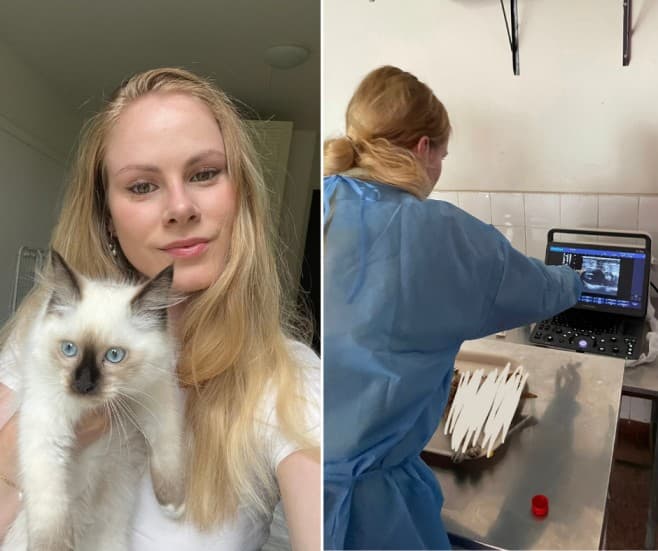10.11.2025
What are you studying?
"I’m studying veterinary medicine. I completed my bachelor’s degree this summer and am now taking a year off before starting my master’s. I decided to take a break so I can continue with my study group, who still need to complete a few courses before they can start the master’s."
"In the meantime, I want to spend a year gaining experience in the life science industry. I currently work in a laboratory animal facility at a scientific CRO and CDMO, specifically in the large-animal section with pigs and rabbits."
Why did you choose that field of study?
"I’ve always loved animals and have been around them my whole life. I grew up with horses, rabbits, guinea pigs, budgerigars, dogs, cats — almost every kind of animal you can imagine. In high school, I chose the biology and chemistry track and was fascinated by biology and all the nerdy details."
Have you always known you wanted to go in that direction?
"No, unlike many other veterinary students, I didn’t always know that I wanted to become a vet. When I was little, it was a childhood dream — but one I quickly moved away from. It wasn’t until my second gap year after high school that I decided to study veterinary medicine."
"Even when I started the programme, I never intended to become a traditional practicing veterinarian. It was the academic courses that really attracted me."
What’s the best thing about your studies?
"Academically, the courses are incredibly inspiring, and you learn so many amazing things. You get a solid understanding of the biology of an individual organism — something you don’t get in many other programmes."
"Socially, the study environment is great. Your fellow students are always willing to share notes and help with understanding the material. There are also many social events, several of which are very traditional. You really get a sense of belonging to a larger community that spans across years and generations."
What’s the most challenging part?
"The exams are really tough. We have exams four times a year, with about two and a half months between each. Our programme is known for having the largest curriculum of any degree. We don’t just learn anatomy, treatment, and diseases for one species — but for many."
"The combination of frequent exams, short intervals between them, and a massive curriculum means you really have to stay focused and learn to prioritize. As one of our professors said in the first year: ‘You don’t have to be specifically smart, just generally not stupid.’ It can be very difficult to navigate and can create a lot of mental pressure."
"I think my curiosity about biological processes and my passion for detail are the perfect combination for working in the life science industry."
What do you dream of doing in the future?
"My dream is to work in life science. I hope to become a researcher, but I’m also very open to other opportunities."
Why do you dream of a career in life science?
"I’m driven by development and learning. I’ve realized that I love my studies because they allow me to immerse myself deeply in a subject and continuously improve. I need to be able to dive into a topic and really geek out."
"The everyday life of a bachelor student also suited me perfectly — being able to organize my own time. That freedom is something I probably wouldn’t have as a practicing veterinarian in a clinic."
"I’m a naturally curious person and want to be part of research in biology that makes a difference for people. I think my curiosity about biological processes and my passion for detail are the perfect combination for working in the life science industry."
You’ve helped create a network group for veterinary students in Pharmadanmark. Why?
"I organize events for the network ‘Veterinary Students in Life Science’ together with Natalie Federspiel. The group is still very new, but we hope it can help us build connections — both among students and with veterinarians already in the field."
"It’s great that we have the chance to create a network we feel is missing in our studies. Unfortunately, we don’t receive much information about life science during our programme, but the network can help us gain insight into the industry and the opportunities available."
"It’s really rewarding to get involved because it feels like we’re creating something meaningful. Building events from scratch is exciting, and it’s great experience."
"You should join the group if you have an interest in life science — or if you’re simply curious about it. Here, you’ll find a community that’s both social and professional."
You can find the network’s Facebook page here: Dyrlægestuderende i Life Science.

Sign up today
Enjoy full Pharmadanmark membership during your studies – for only 0 DKK.
